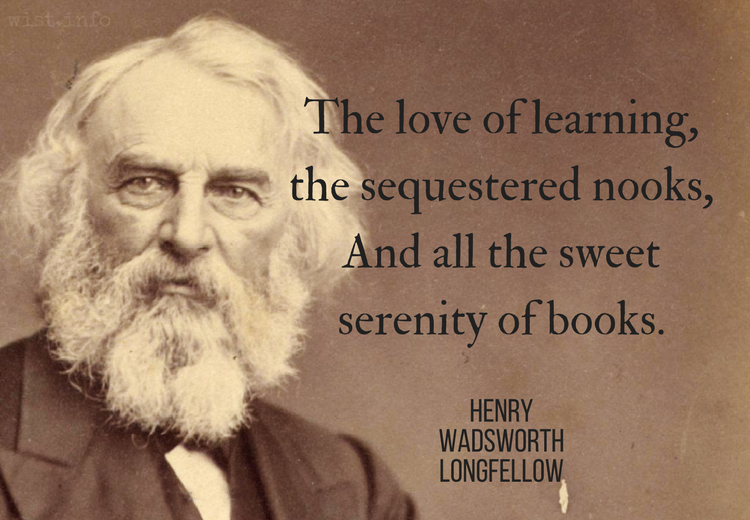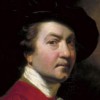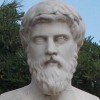I have come to the frightening conclusion that I am the decisive element in the classroom. It is my personal approach that creates the climate. It is my daily mood that makes the weather. As a teacher, I possess a tremendous power to make a child’s life miserable or joyous. I can be a tool of torture or an instrument of inspiration. I can humiliate or humor, hurt or heal. In all situations, it is my response that decides whether a crisis will be escalated or de-escalated, a child humanized or de-humanized.
Haim Ginott (1922-1973) Israeli-American school teacher, child psychologist, psychotherapist [b. Haim Ginzburg]
Teacher and Child, Preface (1972)
(Source)
Quoting his writing as a young teacher.
Quotations about:
school
Note not all quotations have been tagged, so Search may find additional quotes on this topic.
Well, that’s Philosophy I’ve read,
And Law and Medicine, and I fear
Theology, too, from A to Zed;
Hard studies all, that have cost me dear.
And so I sit, poor silly man
No wiser now than when I began.[Habe nun, ach! Philosophie,
Juristerei und Medizin,
Und leider auch Theologie
Durchaus studiert, mit heißem Bemühn.
Da steh ich nun, ich armer Tor!
Und bin so klug als wie zuvor.]Johann Wolfgang von Goethe (1749-1832) German poet, statesman, scientist
Faust: a Tragedy [eine Tragödie], Part 1, sc. 4 “Night,” ll. 354ff (1808-1829) [tr. Luke (1987)]
(Source)
Some translations (and this site) include the Declaration, Prelude on the Stage, and Prologue in Heaven as individual scenes; others do not, leading to their Part 1 scenes being numbered three lower.
(Source (German)). Alternate translations:
I've studied now Philosophy
And Jurisprudence, Medicine,
And even, alas! Theology
All through and through with ardour keen!
Here now I stand, poor fool, and see
I'm just as wise as formerly.
[tr. Priest (1808)]
Now I have toil'd thro' all; philosophy,
Law, physic, and theology: alas!
All, all I have explor'd; and here I am
A weak blind fool at last: in wisdom risen
No higher than before.
[tr. Coleridge (1821)]
I have now, alas, by zealous exertion, thoroughly mastered philosophy, the jurist's craft, and medicine -- and to my sorrow, theology too. Here I stand, poor fool that I am, just as wise as before.
[tr. Hayward (1831)]
I have, alas! Philosophy,
Medicine, Jurisprudence too,
And to my cost Theology,
With ardent labour, studied through.
And here I stand, with all my lore,
Poor fool, no wiser than before.
[tr. Swanwick (1850)]
Have now, alas! quite studied through
Philosophy and Medicine,
And Law, and ah! Theology, too,
With hot desire the truth to win!
And here, at last, I stand, poor fool!
As wise as when I entered school
[tr. Brooks (1868)]
I've studied now Philosophy
And Jurisprudence, Medicine, --
And even, alas! Theology, --
From end to end, with labor keen;
And here, poor fool! with all my lore
I stand, no wiser than before:
[tr. Taylor (1870)]
There now, I’ve toiled my way quite through
Law, Medicine, and Philosophy,
And, to my sorrow, also thee,
Theology, with much ado;
And here I stand, poor human fool,
As wise as when I went to school.
[tr. Blackie (1880)]
I have studied, alas! Philosophy,
And Jurisprudence, and Medicine, too,
And saddest of all, Theology,
With arden labor, through and through!
And here I stick, as wise, poor fool,
As when my steps first turned to school.
[tr. Latham (1908)]
I have, alas, studied philosophy,
Jurisprudence and medicine, too,
And, worst of all, theology
With keen endeavor, through and through --
And here I am, for all my lore,
The wretched fool I was before.
[tr. Kaufmann (1961)]
Alas, I have studied philosophy,
the law as well as medicine,
and to my sorrow, theology;
studied them well with ardent zeal,
yet here I am, a wretched fool
no wiser than I was before.
[tr. Salm (1962)]
I have pursued, alas, philosophy,
Jurisprudence, and medicine, And, help me God, theology,
With fervent zeal through thick and thin.
And here, poor fool, I stand once more,
No wiser than I was before.
[tr. Arndt (1976)]
I've studied, alas, philosophy,
Law and medicine, recto and verso,
And how I regret it, theology also,
Oh God, how hard I've slaved away,
With what result? Poor foolish old man,
I'm not whit wiser than when I began!
[tr. Greenberg (1992)]
Medicine, and Law, and Philosophy --
You've worked your way through every school,
Even, God help you, Theology,
And sweated at it like a fool.
Why labour at it any more?
You're no wiser now than you were before.
[tr. Williams (1999)]
Ah! Now I’ve done Philosophy,
I’ve finished Law and Medicine,
And sadly even Theology:
Taken fierce pains, from end to end.
Now here I am, a fool for sure!
No wiser than I was before.
[tr. Kline (2003)]
What happens when a state tries to purge its state universities or a community tries to purge its public schools of alleged subversives? […] What happens is the demoralization and eventual corruption of the school system. This is not a momentary or even temporary affair; it is something the consequences of which may be felt for years. The search for subversives results in the intimidation of the independent, the original, the imaginative, and the experimental-minded. It discourages independence of thought in teachers and students alike. It discourages the reading of books that may excite the suspicion of some investigator or some Legionnaire. It discourages the discussion of controversial matters in the classroom, for such discussion may be reported, or misreported, and cause trouble. It creates a situation where first-rate minds will not go into teaching or into administration and where students therefore get poor teaching. In the long run it will create a generation incapable of appreciating the difference between independence of thought and subservience. In the long run it will create a generation not only deprived of liberty but incapable of enjoying liberty.
Henry Steele Commager (1902-1998) American historian, writer, activist
“Free Enterprise in Ideas,” Freedom, Loyalty, Dissent (1954)
(Source)
Originally published in the Saturday Review (1952), based on a speech to the Advertising Council's American Round Table, New York City (1951).
Self-education is, I firmly believe, the only kind of education there is. The only function of a school is to make self-education easier; failing that, it does nothing.
Isaac Asimov (1920-1992) Russian-American author, polymath, biochemist
Science Past, Science Future (1975)
(Source)
Teaching takes skill and education and dedication. Home schooling as an idea is on a par with home dentistry.
Dick Cavett (b. 1936) American writer and critic
“Schooling Santorum,”New York Times (24 Feb 2012)
(Source)
I was a model child. It was the teacher’s mistake I am sure. The box was drawn on the blackboard and the names of misbehaving children were written in it. As I adored my teacher, Miss Smith, I was destroyed to see my name appear. This was just the first of the many humiliations of my youth that I’ve tried to revenge through my writing. I have never fully exorcised shames that struck me to the heart as a child except through written violence, shadowy caricature, and dark jokes.
Louise Erdrich (b. 1954) American author, poet
Interview with Lisa Halliday, “The Art of Fiction” #208, The Paris Review (Winter 2010)
(Source)
On the inspiration behind Dot Adare's 1st Grade teacher putting her into the "naughty box" in The Beet Queen (1986).
I endorse it. I think it was correct. Contrary to what many have said, it sought to outlaw neither prayer nor belief in god. In a pluralistic society such as ours, who is to determine what prayer shall be spoken and by whom? Legally, constitutionally or otherwise, the state certainly has no such right.
Martin Luther King, Jr. (1929-1968) American clergyman, civil rights leader, social activist, preacher
Playboy interview (Jan 1965)
(Source)
On the U.S. Supreme Court's decision to ban school-led prayer.
Just as birds sometimes go in search of grain, carrying it in their beaks without tasting it to stuff it down the beaks of their young, so too do our schoolmasters go foraging for learning in their books and merely lodge it on the tip of their lips, only to spew it out and scatter it on the wind.
Michel de Montaigne (1533-1592) French essayist
The Complete Essays, I:25 “On Schoolmasters [Du pédantisme]”
(Source)
We readily inquire, “Does he know Greek or Latin?” “Can he write poetry and prose?” But what matters most is what we put last: “Has he become better and wiser?” We ought to find out not who understands most but who understands best.
[Nous nous enquerons volontiers: “Sçait-il du Gre ou du Latin? Estriil en vers ou en prose?” Mais sìl est devenu ou plus advisé, c’estoit le principal, et c’est ce qui demeure derrier. Il falloit sènquerir qui est mieux sçavant, non qui est plus sçavant.]
Michel de Montaigne (1533-1592) French essayist
The Complete Essays, I:25 “On Schoolmasters [Du pédantisme]”
(Source)
As I left the building, classes were changing and the students were milling about in the halls. They seemed inconceivably young to me. Full of pretense, massively other oriented, ill formed, partial, angry, earnest, resentful, excited, frantic, depressed, hopeful, and scared.
The love of learning, the sequestered nooks,
And all the sweet serenity of books.
A talent forms itself in solitude,
A character amid the stream of life.[Es bildet ein Talent sich in der Stille,
Sich ein Charakter in dem Strom der Welt.]Johann Wolfgang von Goethe (1749-1832) German poet, statesman, scientist
Torquato Tasso, Act 1, sc. 2, ll. 304-305 [Leonora] (1790) [tr. Ryder (1993)]
(Source)
(Source (German)). Alternate translations:
- "A talent doth in stillness form itself -- / A character on life's unquiet stream." [tr. Des Voeux (1827)]
- "Talents are nurtured best in solitude, -- / A character on life's tempestuous sea." [tr. Swanwick (1843)]
- "Man's talent ripens in tranquility, / His character in battling with the world." [tr. Cartwright (1861)]
- "A talent in tranquility is formed, / A character in the turbulence of affairs." [tr. Hamburger (20th C)]
- "Talent develops in quiet places, / Character in the full current of human life."
- Talents are best nurtured in solitude; / Character is best formed in the stormy billows of the world.
- "Genius is formed in quiet, / Character in the stream of human life."
There are obviously two educations. One should teach us how to make a living and the other how to live.
John Adams (1735-1826) American lawyer, Founding Father, statesman, US President (1797-1801)
(Misattributed)
Actually American writer and historian James Truslow Adams (1878-1949). Variants:
- "There are two types of education. One should teach us how to make a living, and the other how to live."
- "There are two educations. One should teach us how to make a living and the other how to live."
A child miseducated is a child lost.
John F. Kennedy (1917-1963) US President (1961-63)
State of the Union address (1962-01-11)
This quotation is usually attributed to Kennedy's 1963 State of the Union Address, but it does not show up in the formal text or the video recording.
It actually appears to be from his 1962 State of the Union address; while it does not appear in the text or the audio recording, it does show up in a copy in Vital Speeches and Documents of the Day, Vol. 2 (1961). There are other small textual changes to the speech in that version, which may reflect a press release version before or after the actual speech.
Studies themselves give forth directions too much at large, except they be bounded by experience.
Francis Bacon (1561-1626) English philosopher, scientist, author, statesman
“Of Studies,” Essays, No. 50 (1625)
(Source)
Cultivated mind is the guardian genius of Democracy, and while guided and controlled by virtue, the noblest attribute of man. It is the only dictator that freemen acknowledge, and the only security which freemen desire.
Mirabeau Buonaparte Lamar (1798-1859) Texas politician, poet, diplomat, soldier
First Message to Congress of the Republic of Texas, Houston (21 Dec 1838)
Frequently quoted by Lyndon Johnson, often paraphrased as "The educated mind is the guardian genius of democracy. It is the only dictator that free men recognize, and the only ruler that free men desire." Rendered in Latin ("Disciplina praesidium civitatis"), it is the motto of the University of Texas.
The mind is not a vessel to be filled, but a fire to be kindled.




















